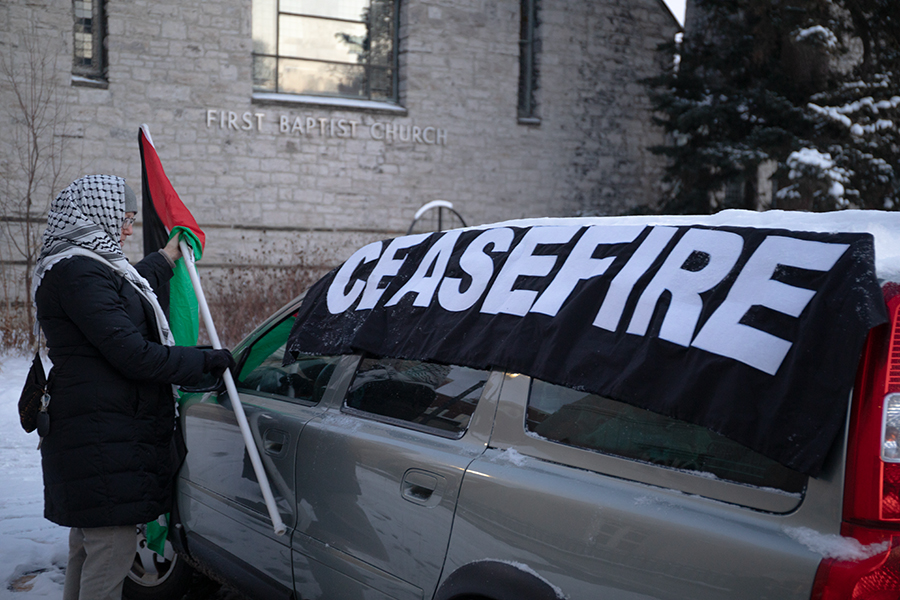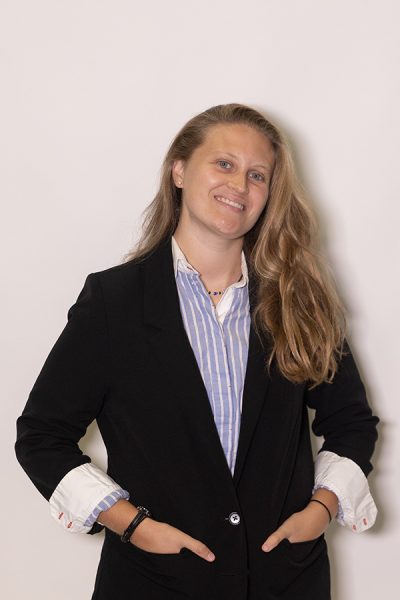After more than 100 days of the Israel-Hamas war, some Ithaca College students have been pushing for more action from the college to support Muslim and Palestinian students on campus.
First-year student Aya Oulida, who is Muslim, is in the process of establishing an Ithaca College chapter of Students for Justice in Palestine (SJP). Oulida said that despite the college communicating the importance of supporting Jewish, Palestinian and Gazan communities on campus, it is not following through.
“I think the college has been doing a lot for the Jewish community and very, very little for the Muslim and Palestinian students at the college,” Oulida said. “I feel like a very important step would be to recognize that there are Palestinians on campus and there are … Muslims on campus and to just recognize those students and what they stand for and make them feel as supported as possible.”
Hillel at Ithaca College has been actively supporting Jewish students since Fall 2023 by spreading the word about services like the college’s Center for Counseling and Psychological Services, meditation at Muller Chapel and hosting a pop-up therapeutic art studio.
Sophomore Quincey Fireside, president of Ithaca College Students For Palestine (ICSFP), said it is important for the college’s Muslim Student Association (MSA) — a student organization for Muslim students on campus — to have more publicity. ICSJP plans to collaborate with the college’s MSA to celebrate Palestinian art and culture with movie nights and events.
“Hillel has so much publicity and the MSA has really none at all,” Fireside said. “I’d love to see some promotion of the school’s Instagram accounts for the MSA. I think President Cornish has alienated herself from the student body … and I’d like to see some active effort to get back in touch.”
ICSFP is not an official organization and has been functioning on Instagram since December 2023. Fireside said ICSPF has potential plans to organize town hall meetings and organize demonstrations to put pressure on the college’s administration, especially Cornish, for their lack of communication.
Local community
The local community of Tompkins County has also pushed for more action. At the Jan. 2 and Jan. 16 Tompkins County Legislature (TCL) meetings — the two public meetings of 2024 — community members urged the legislative body to develop a local resolution calling for a ceasefire.
This was inspired by the resolution that the Tompkins County Human Rights Commission released in December 2023. TCHRC’s resolution strongly urges Tompkins County to call on President Joe Biden and the U.S. Congress for an immediate and sustainable ceasefire and for strong leadership to counteract antisemitism and Islamophobia.
17.8% of U.S. Tax dollars went to the Pentagon and the U.S. Military in 2022, according to the National Priorities Project. This has gone down since 2018, when 24% of taxes went to the military. The TCHRC resolution suggests that U.S. tax money should go to local issues, like low-income housing, adequate public transportation and health care.
About a dozen local residents and members from CeasefireNOW CNY gathered in front of the legislative building Jan. 16 before the TCL meeting. Some of them spoke at the meeting, urging TCL to develop a ceasefire resolution. CeasefireNOW CNY includes members of Jewish Voice for Peace and Tompkins County Showing Up for Racial Justice. The local group has been pushing for a ceasefire between Israel and Hamas since at least Nov. 3, according to the group’s Instagram.
As of now, passing or adopting a ceasefire resolution is not on TCL’s agenda. Tompkins County legislators Susan Currie of District 3 and Veronica Pillar of District 2 volunteered to work on a resolution calling for a ceasefire.
Pillar said there have been internal discussions within the TCL about whether the resolution would explicitly call for a ceasefire or not.
“If we write a resolution, should it call for a ceasefire or call for a ceasefire without using the word ‘ceasefire?” Pillar said. “Or should it not mention anything about U.S. military involvement, what U.S. taxpayers are doing, what Hamas and Israel should or shouldn’t do but of course condemn hate and discrimination and offer resources?”
Pillar said TCL observed an overwhelming amount of public speakers asking for a resolution to call for a ceasefire during the past two meetings. However, the number of individuals who spoke at the meetings has decreased: nearly 50 people spoke at the Jan. 2 meeting and less than 25 people spoke at the Jan. 16 meeting.
Pillar said that if the legislature were to adopt a resolution, it would be unique to the legislative body but would take points from the TCHRC’s resolution.
“A resolution would affirm that we as a county value human rights,” Pillar said. “A county is bigger and louder than an individual person and amplifies our constituents’ voices.”
Legislator Deborah Dawson of District 10 said that calling for a resolution is not a responsibility of the TCL and would not accurately describe the stances every community member has on the issue.
“My feeling is we really have no influence on what happens in the Middle East,” Dawson said. “Any resolution that we pass is really an attempt to articulate a moral position for the residents of our county. … The likelihood that 14 of us are going to agree on a statement that is going to adequately represent [our constituents’] position is less than zero, in my opinion.”
Michael Margolin, a Jewish educator and faith leader at Tikkun v’Or, Ithaca Reform Temple, spoke at the Jan. 16 meeting in support of a ceasefire. Before he spoke, Margolin blew a Shofar, or a ram’s horn, which is a tradition he said wakes the Jewish community up to the humanity of others.
“It’s really sad that it takes this much to organize them to make a resolution,” Margolin told The Ithacan. “This isn’t going to bring about the ultimate change, but this is an important step for us to make a stand.”
During the Jan. 16 meeting, Cornell University student Jeronimo Pinto said the Israel-Hamas war is a local issue because of Cornell’s tie with the Technion-Israel Institute of Technology. The institute uses its research and development of military technology to maintain its occupation of Palestine, according to The Nation.
“Not only is Cornell actively partnering with these companies — making it so that students can find an easy way to be siphoned into being employed by these companies who are currently profiting off genocide … they’re also actively invested in many of these companies,” Pinto said.
Demands for a ceasefire have also been seen in several parts of New York, like in Monroe County and in Syracuse. A resolution to call for a ceasefire has been successfully passed in Albany.
Oulida said college students should make a stand as well and said she hopes that people at the college focus on the humanitarian aspect of the Israel-Hamas war.
“With this specific issue, a lot of people tend to say it’s about religion or it’s Palestinians versus Israelis, but it really just comes down to humanity and human rights,” Oulida said. “I hope that some other organizations on campus can just come together and focus on what’s really important, which is social injustice that’s happening in Palestine and human rights.”
















Tal Aizen • Jan 25, 2024 at 8:25 pm
Let’s also discuss that this war did not begin in a vacuum. Ignoring the terrorist activity that Hamas and the PLO have perpetrated against their own constituents and civilians in Israel and the sizable bombardments Israel has done in Gaza since its unilateral withdrawal in 2006 creates for a lackluster argument.
I appreciate anecdotes from the leaders of student organizations, but comments from all sides should be critiqued as these are not professionals.
For instance, the mention of genocide in this article is still unfounded and should be corrected until a ruling by the ICJ.